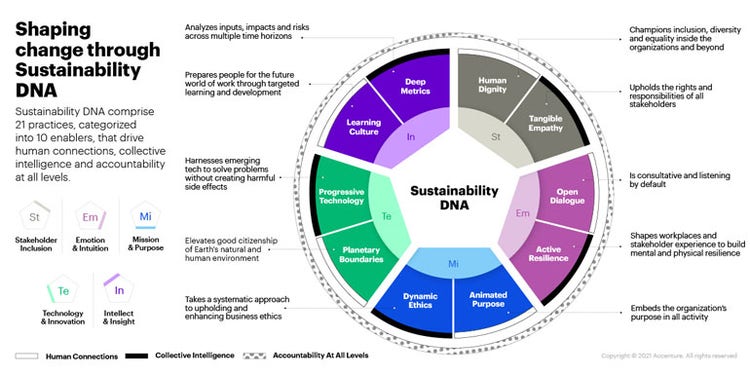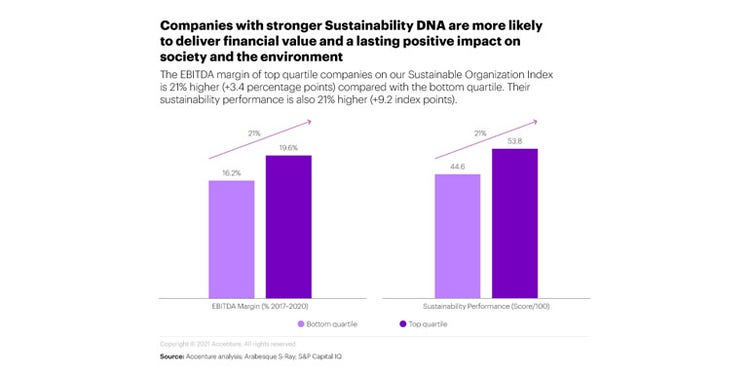September 22, 2021
Accenture and the World Economic Forum Decode the “Sustainability DNA” for Companies Seeking to Deliver Value and Impact for All Stakeholders
Companies with deeply embedded stakeholder management practices generate over 20% more in profit as well as environmental and societal impact
NEW YORK; Sept. 22, 2021 – New research from Accenture (NYSE: ACN) and the World Economic Forum uncovers the capabilities that C-Suite leaders need to build sustainable organizations that deliver lasting value and equitable impact for their people, customers and wider communities.
The report, Shaping the Sustainable Organization, finds that the responsible values and environmental, social and governance (ESG) intentions of companies are outrunning the ability of their organizations to deliver. To convert sustainability goals into reality, Accenture and the World Economic Forum decoded "Sustainability DNA," a set of 21 management practices, systems and processes that form the foundations of stakeholder-centricity.

“The world’s environmental and social challenges are already disrupting business today,” said Peter Lacy, chief responsibility officer and global Sustainability Services lead. “But our research with the World Economic Forum found that those who root their organization and leadership DNA in stakeholder-centricity enjoy significantly better sustainability performance and value creation. These pioneers utilize new technologies and ESG data sets to create more sustainable and resilient supply chains, systematically harness the innovative power of diversity, and drive growth by putting stakeholder needs at the heart of products, services and new market opportunities. Those who ignore this moment to position for the future risk being left behind.”
To assess the strength of Sustainability DNA in companies around the world, Accenture and the World Economic Forum created the Sustainable Organization Index (SOI), which scores nearly 4,000 companies based on market-facing evidence of ESG-supporting practices in 146 areas. Organizations in the top quartile of the SOI show significantly stronger performance compared to those with lower or less consistent scores. Specifically, companies with a stronger Sustainability DNA achieve on average a 21% increase in both EBITDA margin and environmental and societal impact.

According to the report, embedding Sustainability DNA drives behavioral changes throughout organizations in three ways — by fostering human connections, boosting collective intelligence and driving accountability at all levels. Overall, companies tend to score higher on enablers that deepen “human connections” (average SOI score = 57), reflecting their ability to engage stakeholders, but are weaker on enablers that build “collective intelligence” (47), suggesting a struggle from leadership teams to build stakeholder-centricity.
Overall, the average score across all companies in the SOI was only 52/100, suggesting that most have significant room to strengthen their Sustainability DNA. The report advocates three steps organizations should take to create a cycle of change that generates value for all stakeholders:
- Diagnose: Conduct a high-level assessment using diagnostic tools that uncover areas of the business where the Sustainability DNA is stronger and where more work is needed.
- Define: Identify key interventions needed to meet the organization’s sustainability goals using a variety of different inputs.
- Develop: Build a roadmap based on the organization’s vision for change with a clear set of KPIs to measure success in strengthening Sustainability DNA on an ongoing basis.
“The all-encompassing impact of COVID-19 made us understand that businesses need to address the needs of all stakeholders,” said Professor Schwab, Founder and Executive Chairman, World Economic Forum. “By investing in organizational practices that stick, businesses will be better placed to achieve their financial goals while contributing to social welfare and the common good.”
For more information on Shaping the Sustainable Organization, please visit www.accenture.com/sustainableorg.
About the Research
The Sustainability DNA model was developed through business leader, consumer and employee surveys and interviews. To validate the model, we worked with Arabesque S-Ray, an environmental, social, and governance (ESG) data provider, to build the Sustainable Organization Index (SOI) which grades nearly 4,000 companies according to market-facing evidence of ESG-supporting practices in 146 areas. We then used econometric analysis to test the relationship of SOI scores with financial and sustainability performance.
A bout Accenture
Accenture is a global professional services company with leading capabilities in digital, cloud and security. Combining unmatched experience and specialized skills across more than 40 industries, we offer Strategy and Consulting, Interactive, Technology and Operations services — all powered by the world’s largest network of Advanced Technology and Intelligent Operations centers. Our 569,000 people deliver on the promise of technology and human ingenuity every day, serving clients in more than 120 countries. We embrace the power of change to create value and shared success for our clients, people, shareholders, partners and communities. Visit us at www.accenture.com.
About the World Economic Forum
The World Economic Forum is the International Organization for Public-Private Cooperation. It engages the foremost political, business, cultural and other leaders of society to shape global, regional and industry agendas. It was established in 1971 as a not-for-profit foundation and is headquartered in Geneva, Switzerland. It is independent, impartial and not tied to any special interests.
# # #
Contact:
Alexander Aizenberg
Accenture
+1 917 452 9878
[email protected]